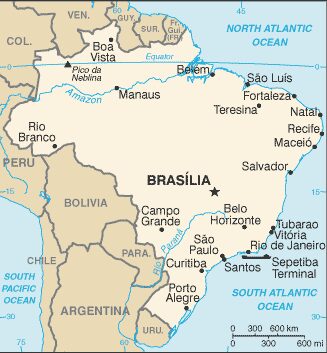Brazil
Brazil
| Area | 8,514,877 sq km |
|---|---|
| Population | 190,010,647 |
| Capital | Brasília |
| Language | Portuguese |
| States | 26 and one federal district |
| GDP | $1.067 trillion (Nominal) $1.701 trillion (purchasing power parity) |
Brazil, officially the Federative Republic of Brazil (Portuguese: República Federativa do Brasil), with over 3 million square miles of territory and a population of 190 million people, is the fifth largest nation in the world by population and is also fifth in terms of area. It is the largest country in South America, bordering the Atlantic Ocean by 8,500 km. The neighbors are French Guiana, Suriname, Guiana, Venezuela, Colombia, Peru, Bolivia, Paraguay, Argentina and Uruguay.
It is the only Latin American country settled and colonised by Portugal. In the local language, Portuguese, the country's name is spelled Brasil; the name comes from a kind of wood named pau brasil (brazilwood), of a reddish colour, used to extract dyes for coloring.
History
The country was discovered in 1500 by the Portuguese sailor Pedro Álvares Cabral. The official version is that his fleet accidentally encountered new land when it strayed from Africa on its way to India, but modern authors believe that the Portuguese already did have some knowledge of Brazil's existence, after other navigators like the Spanish Vicente Yañez de Pinzón had already sighted land in the vicinity.
Brazilwood was the first natural resource exploited by the Portuguese, who subsequently extracted sugarcane, gold and silver from the land. Portuguese colonisation settled mainly in the coastal areas, leaving vast interior regions of the country largely unexplored until quite recently.
The country's first capital was Salvador, in the northern state of Bahia, until it was replaced by Rio de Janeiro in 1763.
Brazil has suffered in its early history some invasions from other European countries; in 1555 the French, led by the Huguenot officer Nicolas de Villegagnon, founded a settlement in Guanabara Bay, close to present-day Rio de Janeiro, naming the territory France Antarctique (Antarctic France). The colony did not last long, however, and was ultimately wiped out after a series of skirmishes with local Portuguese colonists and their local Indian allies. Another attempt of French colonisation was attempted in 1612 in the northern part of the country, in present-day São Luís, capital of the state of Maranhão, the short-lived France Équinoxiale.
In the 17th century the Netherlands attempted successively to settle in the northern half of the country; after sacking initially the coast of Bahia and capturing briefly the city of Salvador, they then set up in the cities of Recife and Olinda, where they stayed for roughly 30 years until Portuguese and local resistence finally forced their withdrawal.
For almost three centuries Brazil was merely an unimportant supplier of commodities to Portugal, until in 1808 it became effectively the centre of the kingdom: the Portuguese Royal Family was forced to move to Brazil, escaping Napoleon, after an alliance with the United Kingdom which made the escape possible.
Brazil became an independent nation in 1822 and a republic in 1889.
Brazil endured more than twenty years of a military dictatorship which, although less violent than its counterparts in the region, severely affected the political and cultural life of the country. In 1864, it entered in a devastating war against Paraguay, known as the War of the Triple Alliance. In 1985 the military regime peacefully ceded power to civilian rulers, and the country is now one of the largest democracies in the world. Brazil is still an underdeveloped country, and continues to pursue industrial and agricultural growth and development of its interior, exploiting vast natural resources and a large labor pool. Highly unequal income distribution remains a pressing problem.
Brazil, however, is today South America's leading economic power and a regional leader. Characterized by large and well-developed agricultural, mining, manufacturing and service sectors, Brazil's economy outweighs that of all other South American countries, and is expanding its presence in world markets.
Politics
Levine (2003) shows Brazil is a nation beset with contradictions. Although the country is a democracy, citizens over age 18 are required to vote, and in the 1998 presidential election, for instance, 30% of the ballots were invalidated or reported blank. In most isolated parts of the interior it is not uncommon for the people from a given region to vote for whichever candidate is being supported by the local power figure, a system known locally as coronelismo.
Society
Brazilian politics and society are continually divided between a wealthy, privileged minority and a poor and uncultured majority. This situation maintain Brazil's status as one of the most unequal societies in the world.
Further reading
Surveys
- Branco, Sandra. Brazil - Culture Smart!: a quick guide to customs and etiquette (2006) excerpt and text search
- Crocitti, John J., and Robert M. Levine, eds. The Brazil Reader: History, Culture, Politics (1999) 530 pgs. online edition; also excerpt and text search
- Levine, Robert M. The History of Brazil (2003) 256 pgs. online 1999 edition; also excerpt and text search 2003 edition
- Eakin. Marshall. Brazil: The Once and Future Country, 2d ed. (1998), interpretive synthesis of Brazil's history excerpt and text search
- Page, Joseph A. The Brazilians (1995). excerpt and text search
- Schneider, Ronald M. Brazil: Culture and Politics in a New Industrial Powerhouse (1996)
